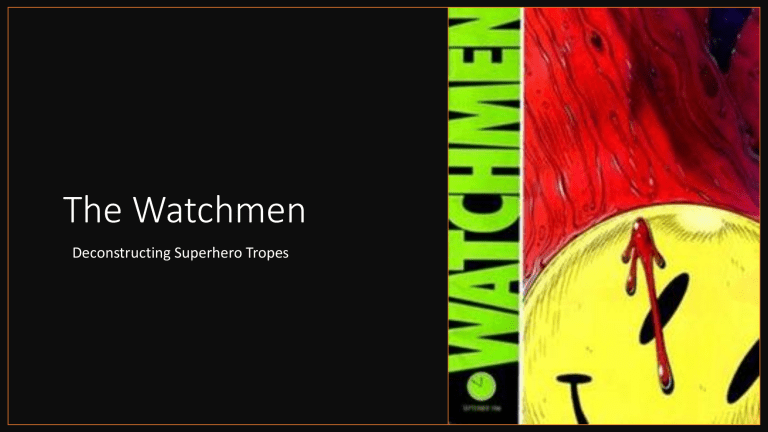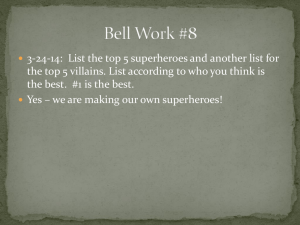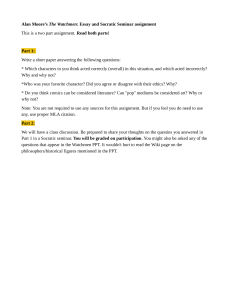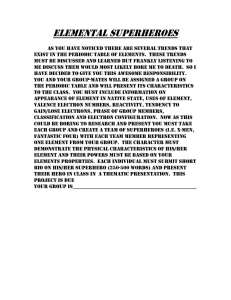
The Watchmen Deconstructing Superhero Tropes Setting • The Watchmen takes place in an alternate history in which, due to the presence of a real life superhero, America easily wins the Vietnam war, Nixon becomes a near dictator in the USA, and the cold war with the USSR has led to an all but certain upcoming nuclear attack. Plot • Someone has been killing superheroes. The story is a murder mystery in which the heroes try to track down the killer before they are killed next. Meanwhile, the world is on the bring of destruction from nuclear war due to cold war tensions. Structure • The story begins “In Media Res” (in the middle). Many Greek tragedies follow this structure. • Throughout the comic, there are sections from the original Night Owl’s memoir Under the Hood, a book that exists in the world of The Watchmen. • There is also a comic called Tales from the Black Freighter, a comic-within-the-comic, that seems to be unrelated to the story plot-wise, but its importance thematically is later revealed. The story is being read by a boy at a comic book stand in the story. • The art work itself is structured with interesting symmetry and visual clues. Structure (visual) • Note the action figures on the desk pounding in grief on the newspaper and its headline. • Note how the ink blot becomes the shadows in the next panel • Note the symmetry in the panel layouts (especially in Chapter 5) • Panels with graffiti in the background: “Who watches the watchmen” • The repeating visual motifs (the face that appears on mars) • “Graphic Match Cuts” Some background on the author • The Watchmen was written by Alan Moore to deconstruct Superhero comics. He determined that, if superheroes existed in real life, they would be very messed up people, so he wanted to examine their psychology. He couldn’t get the rights to use existing superheroes, so he based the characters off of these older characters that already existed. Most characters espouses a certain philosophical world view. • Alan Moore is an anarchist who believes in practicing magick. He is an influential comic author. He doesn’t like movies being made from his comics. But… They’ve made many of his works into movies (which I’m sure he’s super happy about…) Characters VS The Minutemen • An older vigilante organization that The Watchmen were inspired by and look up to. We see them in the story through flashbacks and entries from Night Owl I’s autobiography. Rorschach • Rorschach is a vigilante who wears a Rorschach ink blot mask on his face. He is based on the older Steve Ditko characters “The Question” and “Mr. A”. Though he has a moral code of his own, he is also shown to be a violent sadist, and probably a misogynist and racist. He has been accused to secretly use his philosophy toward “fascist” ends by some readers. Alan Moore was shocked readers looked up to this character. Objectivism • Nobody has any obligation towards others, one must only pursue one’s one wishes, but not harm wishes of others. It is against the state and only believes in individuals…however, that also means charity is not an obligation. It is for total free market capitalism and ant-religion. This “philosophy”, created by Ayn Rand, an escapee to the USA from the USSR as a child, is often derided by other philosophers for its lack of rigorous intellectual logic. Right wing American politicians like her. Also there is only right and wrong, black and white thinking— there are no shades of grey or moral relativism. Would you steal to save a life? • A woman was on her deathbed. There was one drug that the doctors thought might save her. It was a form of radium that a druggist in the same town had recently discovered. The drug was expensive to make, but the druggist was charging ten times what the drug cost him to produce. He paid $200 for the radium and charged $2,000 for a small dose of the drug. The sick woman's husband, Heinz, went to everyone he knew to borrow the money, but he could only get together about $1,000 which is half of what it cost. He told the druggist that his wife was dying and asked him to sell it cheaper or let him pay later. But the druggist said: “No, I discovered the drug and I'm going to make money from it.” So Heinz got desperate and broke into the man's laboratory to steal the drug for his wife. Should Heinz have broken into the laboratory to steal the drug for his wife? Why or why not? What would an objectivist say? Deontology • A deontologist does not believe in the “ends”. “The ends justify the means” makes no sense to them. “I will not compromise. Not even in the face of Armageddon” • Rorschach’s favorite maxim, is an echo of the deontologist’s slogan, “Let justice be done, though the heaven may fall”. Deontology goes beyond saying that the ends justify the means. It actually says that at least in moral decisions, you shouldn’t think in terms of ends and means, or consequences, at all. Once you start thinking about means and ends, you’ve left the realm of morality altogether, because you’re only thinking about how to get something you want, either for yourself or someone else. According to Immanuel Kant, morality begins with the good will. Anything else you might value in life; intelligence, strength, even happiness itself, can be used for evil. The only thing good, really, is the will to do good, the mental act that says, “I am going to do the right thing.” Should Batman Kill the Joker? • The Joker has killed hundreds, thousands, maybe millions of people over his run in the comics and movies. Every time Batman puts him away in Arkham Asylum, he eventually escapes and does more crime, murder, and mayhem. Shouldn’t Batman just kill him? Is Batman responsible for Joker’s victims if he fails to kill him? Is it ever ok to lie? Can you lie to a Nazi to save a Jewish person in hiding? Is morality about the ends, or the act itself? Ozymandias • Based on the character “The Thunderbolt”. His name is taken from the Shelley poem of the same name. Ozymandias (real name Adrian Veidt) worships Alexander the Great and names himself Ozymandias (the Greek name for Ramses II, the Egyptian pharaoh). He inherits a great fortune, but gives it all away to prove he can earn it himself, and thinks himself The Smartest man in the world”. He becomes rich of merchandising superhero figures. He becomes convinced that superhero actions are not enough to fix the world, and systematic changes need to be made. What is the meaning of this poem? Consider the meaning of the allusion being made in this character's name. Utilitarianism • Unlike Rorschach, Veidt doesn’t deal with a world of black and white, of evil and good. Everything is gray, but some gray areas are darker than others. To do the right thing, Veidt simply chooses the “lightest shade of gray”. Utilitarianism says “Whatever procures the greatest happiness for the greatest good” is right. So in the Trolley dilemma, If you can kill one person to save five, then you should kill one. Jeremy Bentham espoused Utilitarianism. The Trolley Dilemma: What would Ozymandias do? What would Rorschach do? What would YOU do? Utilitarianism ethical issues • Can I kill you and take your organs to save five people who need an organ transplant? • Can I jail many innocent people if it results in jailing some guilty people to prevent terrorist attacks on many more people? Do culture’s view ethics differently? How are these men viewed by most historians? Does that effect your view of their words? *Also said by William Blackstone, called “Blackstone’s Ratio”: “is better that ten guilty persons escape than that one innocent suffer” *Also popular in 1930’s China: “Better to kill a hundred innocent people than let one truly guilty person go free” Kohlberg’s Levels of Morality: What level is your ethical reasoning at? The Comedian • The Comedian, though a “hero”, is shown as a violent and sadistic man. He’s said to be based no The Peacemaker, and also a little bit of Captain America and Nick Fury (but examining what a super nationalistic soldier would be like in real life). He almost seems more based on The Joker according to his philosophy. Blake's moniker of "The Comedian" stems from his cynical and arguably selfish world perspective that "in an insane world", one can only laugh, as if everything is "a joke". Moore took the idea of the name from Graham Greene's novel The Comedians. This idea is similarly echoed as Joker’s inspiration in Alan Moore’s The Killing Joke. Nihilism • Nihilism is the belief that nothing matters: There is no god, no purpose, so there is only despair. While often associated with nihilism, Nietzsche's philosophy actually stated that nihilism was a state that needed to be overcome. Nietzsche said “God is dead, and we killed him.” His book Thus Spoke Zarathustra is a treatise on overcoming the nihilism from the loss of moral values provided by religion and finding one’s own values in life. Schopenhauer’s negative view has also been associated with nihilism, but he viewed it could be overcome with compassion. Max Stirner, meanwhile, embraced Nihilism as Egoism. Max Stirner “went to remarkable lengths in glorifying crime” and justified “theft, dishonesty, rape and murder.” Existentialism/Absurdism • Existentialism also says life has no value except for what we make it. Therefore, one does not need to despair or be violent. If one finds value in protecting others, then it is valid. If one finds value in life from making art, then it is valid. Jean-Paul Sartre and Simone de Beauvoir, his wife (in an open relationship), espoused these ideas. • Absurdism says life has no value, but any value we give it is therefore also a joke. One needs to find joy in the meaningless existence itself. Albert Camus espoused this theory in his works like The Myth of Sisyphus. • These don’t have to be negative or violent philosophies! These are remedies to Nihilism. Sisyphus & Philosophy • A Greek king who was punished by the gods for his hubris and trickery. He had to roll a boulder up a hill in Hades, but the boulder was cursed to always roll down the hill again, so he endlessly had to do this task. • Camus said one could “imagine Sisyphus happy”. How? If you commit to your task (life) fully and embrace the meaninglessness. Stuck rolling boulders? Make it a sport: try and beat your record. Or, admire the texture and shades of the rock. Night Owl II • Successor to the mantle from Night Owl I, Night Owl is based on Blue Beetle. He is like a less competent Batman, using gadgets to fight crime. He is having a bit of a “mid-life crisis”, but finds being a superhero reinvigorates him. Altruism • Probably coined by the secular humanist philosopher Auguste Comte: one has a duty to help others. The quote, “With great power comes great responsibility,” from Spiderman sums up this belief. “An action is right if it brings good consequences”. So lying is not inherently wrong, it depends why one is lying. If you lie to a Nazi to save Anne Frank, then the lie was ethically correct. If you lie to your mom to steal a cookie, then the lie was not ethical. Many philosophers have agreed with altruism, to varying degrees. • Aristotle’s Virtue Ethics: Doing the right thing in right situation. Kant on Altruism “Many souls are so compassionately disposed that, without any further motive of vanity or self-interest, they find an inner pleasure in spreading joy around them.” (4:398) He is by no means contemptuous of them—on the contrary, he says that they “deserve praise and encouragement” (4:398). But not the highest praise or the strongest encouragement. What they do not deserve, he says, is our “esteem”, because their motivation “has no genuinely moral worth”. That is because the “maxim” of what they do “lacks the moral merit of such actions done not out of inclination but out of duty” (4:398). Kant means that these people are not following a rule when they help others— a rule, rationally acceptable to all, according to which all those who are in such and such circumstances ought to be helped because it is morally right to do so. (The term “such and such circumstances” is a place-holder for a phrase stating in general terms what those circumstances are.) These compassionate people act instead on an emotional basis: they are pained by the misfortunes of others, and they know that if they offer their help, they will give themselves pleasure. That is a good motive, Kant thinks, but it ought not to be one’s sole or primary reason for helping others. Why does Night Owl help other? Is his “motive” out of pure altruism? Silk Spectre II • Based on the character Nightshade • At first she does not want to be involved…she never wanted to be a hero. Her mother, the original Silk Spectre, wanted her involved. She is passive, but gets involved when the murder mystery starts because all her friends are “capes” (slang for superheroes). It’s like someone who got involved in WWII because all their friends were Jews, not because of moral obligation against genocide. • She does not necessarily clearly represent a philosophical school of thought, because she is the most “human” and act as a stand in for the reader in this world of superheroes. Ethics of Care • Silk Spectre II makes her choices based on helping people and caring about human life, not on an abstract logical or philosophical level, but in a humanistic way. Some say this is similar to Nel Noddings “Ethics of Care” or Carl Rogers “Humanistic Approach” in Psychology. Feminism • Consider “The Male gaze”: her mother, the original Silk Spectre, wore a skimpy costume to fight crime, but mostly served as “eye candy” but did little crime fighting. She was the victim of sexual violence • Silk Spectre II comments on female costumes, and does not like being treated as a mere object by Dr. Manhattan. Are these characters defined by themselves, or only by their relationships to others? • What is Alan Moore saying about the way women are portrayed in comics? • Is Moore accidently committing the same flaws in his portrayal of Silk Spectre II? Dr. Manhattan • Based off Captain Atom. Dr. Manhattan is scientist who is accidently blown apart in an experiment and then reconstructed on the quantum level. The only one with real superpowers. He is used as a weapon by the USA to win the Vietnam war. He becomes increasingly disillusioned with people because he can see the past and future and create and destroy anything, and becomes fatalistic, stating at one point “there is no difference between a living and a dead body on an atomic level”. Determinism/Materialism Everything that will happen will happen--At odds with belief in free will. There are many branches of Determinism, from the Calvinists Theological Determinism, to the early Stoics Compatibilism. Dr. Manhattan’s attitude is reminiscent of Billy Pilgrim’s in Kurt Vonnegut’s Slaughterhouse Five: “…so it goes”. Materialism says that only matter is real. Even our consciousness is merely “electrons in the brain”. Do you believe in free will? • What proof is there that free will exists? What proof is there against this belief? (Consider: twin studies, cultural Psychology, Conditioning, brain activity 500 milliseconds prior to conscious thought in Libet’s neurological study). • If our choices are based on our environment and upbringing, how responsible are we for our actions? Can we read this characters as avatars for a philosophical school, or are they just Psycho 神经病? A Psychoanalytic reading: • “I'm not sure how productive it is to look for orderly ethical codes in the heroes of Watchmen. For the most part, their motives are more psychiatric than philosophical: Dr. Manhattan is dealing with a growing sense of alienation; Night Owl and Silk Spectre have got an identity crises on their hands and are dealing with mid-life crisis impotence; Ozymandias is of course a megalomaniacal narcissist with extinction anxiety from the doomsday clock; and Rorschach is just a Freudian fantasy.” Other Things To Consider • Can Graphic Novels be literature? • Does the medium or the message matter more? Can pop culture (like comics, K-pop or rock music, video games, etc.) also be art? • How does The Watchmen deconstruct the ideas previously held about superheroes? • What was, according to author Alan Moore, its “unfortunate influence” on comics afterwards?




